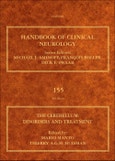The Cerebellum: Disorders and Treatment, Volume 155 updates readers on the latest and clinically relevant advances in the study of cerebellar diseases in children and adults. It is organized into sections detailing: (1) Disorders (starting from the fetal cerebellum, to adult cerebellum) encountered during daily practice, and (2) Therapy (including insights into innovative drug and rehabilitative approaches). The book's innovative structure discusses cerebellar disorders in children and adults as a continuum, with its companion volume, The Cerebellum: From Embryology to Diagnostic Investigations detailing embryology, anatomy, function and diagnostic investigations and neuroimaging, including conventional sequences, diffusion tensor imaging, functional MRI, and connectivity studies.
Table of Contents
Section I. Disorders 1. Fetal cerebellar disorders 2. Chiari 1 deformity in children: etiopathogenesis and radiological diagnosis 3. Cerebellar injury in preterm infants 4. Cerebellar involvement in Autism and ADHD 5. Recessive ataxias 6. Non-progressive congenital ataxias 7. Non-syndromic cerebellar ataxias associated with disorders of DNA single-strand break repair 8. Metabolic ataxias 9. Mitochondrial ataxias 10. Spinocerebellar ataxias 11. X-linked ataxias 12. Spastic ataxias 13. Episodic ataxias 14. Sporadic adult onset ataxia 15. Epigenetic cerebellar diseases 16. Essential tremor and the cerebellum 17. The cerebellum and dystonia 18. Cerebellar mutism syndrome 19. Cerebellar tumors 20. Cerebellar stroke in adults and children 21. Immune-mediated ataxias 22. Toxic-induced cerebellar syndrome: from the fetal period to the elderly 23. Endocrine disorders and the cerebellum: from neurodevelopmental injury to late-onset ataxia
Section II. Therapy 24. Drug treatment 25. Neurotransplantation therapy 26. Noninvasive stimulation 27. The cerebellum from the fetus to the elderly: history, advances and future challenges








